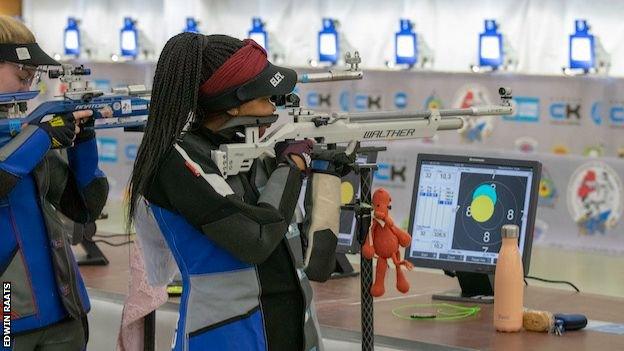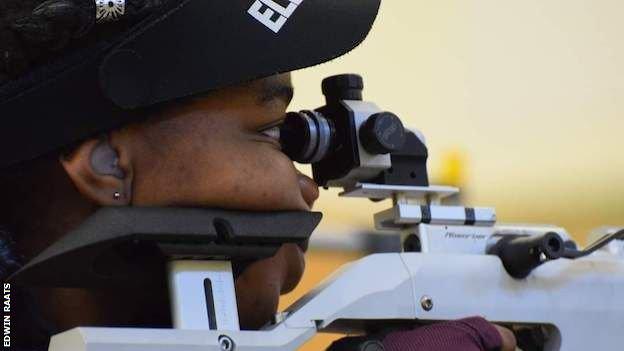Generation Next: GB shooter Ruth Mwandumba on making lasting change in her sport
- Published

Ruth Mwandumba is on British Shooting's talent pathway
BBC Sport's 'Generation Next' follows a group of inspirational young athletes, from a range of backgrounds and sports, as they bid to become our next sporting superstars.
Ruth Mwandumba used to travel in her British Shooting kit in case she was stopped and searched by police and they found her rifles in the car.
"I just thought if I ever get stopped then I want them to see what I'm wearing before they make any kinds of judgements," she says.
That was when she was at university in London. It never happened to her, but it had to friends.
Now living back in her hometown of Crosby, Merseyside, Mwandumba does not feel the need to do it any more. But, as one of very few black shooters in the sport, she wants to make a difference.
"The first time I realised that I wanted to make a change is when I first started shooting competitively. I realised I was the only black shooter on the scene at the time - not only in the UK, but when we were travelling for competitions within Europe too. It was very noticeable," the 25-year-old tells BBC Sport.
"It didn't really affect me too much, but it was something that was always in the back of my mind.
"Ever since then, I've made it an aim of mine to make a change by the time I do eventually leave the sport - whenever that is."
Not that Mwandumba is thinking of leaving any time soon. She is just getting started.
'I'm different - but I can still do the same if not better than you'

Mwandumba wants to compete at the Olympics and World Championships
Having first discovered target shooting as a young teenager in Army cadets, she was 18 and at university when she joined a club. Four years later, she was English champion - the first black woman to achieve the feat.
"It took something like that for me to realise that I do have talent and potential to to go far," she says.
And that is exactly what she plans to do. The long-term goal is the Paris 2024 Olympics but , before then, she wants to compete at the World Championships and Commonwealth Games.
Even if she does not make it to the top, as long as she leaves her mark on the sport it will be job done for Mwandumba.
"Making it to an Olympics and other major Games is a huge bonus, and it is an aim of mine," she says.
"However, I do think that I'd be able to highlight the issues of diversity within the sport and work on making changes no matter what level I'm at."
While she emphasises the shooting community in Britain is a friendly one, Mwandumba has come up against racial stereotyping outside of the sport.
Speaking to BBC Sport in October as part of Black History Month, Mwandumba told of how she has faced remarks like "of course you're good at shooting, you're black" on too many occasions.
"A lot of people try and play it off as banter and don't really understand the negativity that can come from it," she says. "That's something that I've dealt with a lot, and still do occasionally."
She has also, on one occasion, been made to feel unwelcome in the sport.
"I travelled abroad for a competition in Luxembourg and there were a group of girls from another country who went out of their way to make me feel very uncomfortable," Mwandumba says.
"If anything, that pushed me to show them that: 'Yes, I'm different, but I can still do the same if not better than you.' I didn't want anyone to ever look at me differently and think that it was going to make me any different as a shooter."
If you're wondering, she did beat those girls.
Allow Instagram content?
This article contains content provided by Instagram. We ask for your permission before anything is loaded, as they may be using cookies and other technologies. You may want to read Meta’s Instagram cookie policy, external and privacy policy, external before accepting. To view this content choose ‘accept and continue’.
'If other people can do it, why can't I?'
It is not just in shooting that Mwandumba is excelling. She is studying for a PhD in epidemiology at the University of Manchester, looking at infectious wounds in Malawi - where her family are from - and following in the footsteps of her father, a specialist in infectious diseases.
During the coronavirus pandemic, she has been working in a hospital as a clinical coder, as well as balancing her training - at home - and studies. She hopes one day her academic career will take her around the world, conducting research in low-income countries but, for now, shooting takes priority.
At first, she did not know shooting was an Olympic sport. She was just glad to have found something for which she did not have to be "super, super fit".
However, her inspirations come from a sport in which you do - and Mwandumba does not have to think too hard when asked who her sporting icons are.
"[Sprinter] Dina Asher-Smith and [heptathlete] Katarina Johnson-Thompson. When I was growing up, I loved seeing like people who looked similar to me excelling in their sport," she says.
"I truly believe it is one of the factors that motivates me still to this day and pushed me to get to where I am. I almost had the mindset of: 'If other people can do it, then why can't I?
"Yes, the sports are different, but we all have the same long-term goal at the end of it, which is to compete at the highest level for our country."
Buoyed by the impact such athletes had on her, Mwandumba wants to replicate that with those who may be listening to her.
"I used to watch all of the black athletes, and I'd follow their social media platforms as well, and anything they said I'd be keen to listen to," she says.
"So, for me to grow up to be one of them, I think it made me realise how important my voice actually is."